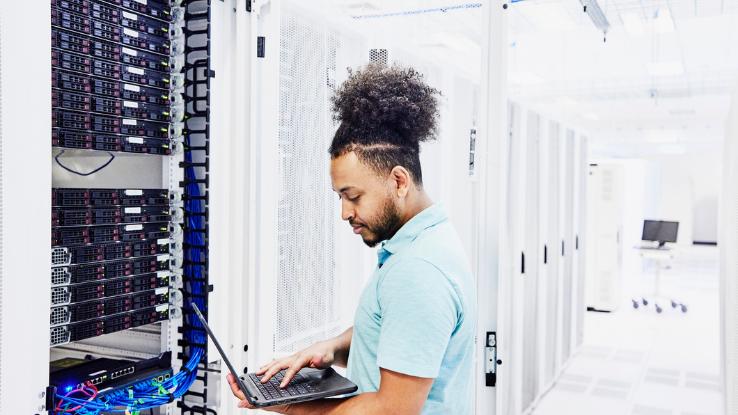Cybersecurity Awareness: How to Protect Yourself from Cybercrimes

Cybersecurity awareness means actively protecting your personal infrastructure and information. The subject may still seem somewhat new to you, but it’s only going to become a more pressing issue as society continues to develop technologically. On October 1, 2021, President Joe Biden told the nation, “I am committed to strengthening our cybersecurity by hardening our critical infrastructure against cyberattacks, disrupting ransomware networks, working to establish and promote clear rules of the road for all nations in cyberspace, and making clear we will hold accountable those that threaten our security. ”
That day, Biden signed an Executive Order, furthering his commitment to cybersecurity. Of course, this is not the U.S. government’s first cybersecurity commitment: the Cybersecurity and Infrastructure Security Agency (CISA), an intelligence agency similar to the FBI or CIA, was formed in 2018.
However, cybercrime has been on the rise since the COVID-19 pandemic started. As schools, businesses, and entertainment went virtual, people were online more than ever. Hackers, e-scammers and other cybercriminals impacted both massive companies and individual citizens alike. To help you protect your personal infrastructure, we’ve compiled a sampling of cybersecurity best practices.
Cyber Security Basics and Best Practices

Let’s start with a few basics. Google defines “hacking” as the unauthorized access to data in a computer or system. “Spyware” is a type of software that allows users to acquire and access someone else’s activity and other information. “Malware” sets out to disrupt, damage, or gain access to a program or system. “Ransomware” will block someone from a particular digital space until a sum of money is paid. When we say “firewall,” we mean a part of a network that’s designed to block other people from viewing your activity, so it can prevent spyware or ransomware from impacting you.
The FBI has put together a list of practices that bolster one’s cyberinfrastructure. They include keeping your firewall turned on. If a website won’t run while your firewall is active, you could open yourself up to potential cyberattacks. Installing and regularly updating antivirus software and antispyware technology is a must.
The type of software you use to protect yourself from viruses and spyware may depend on whether you have a Mac or PC. The FBI also recommends making sure your operating system (OS) is up to date. You might currently have Mac OS, MS Windows, Chrome OS or another operating system. It’s best to check for updated versions periodically.
Another tip is to consider using a digital wallet to keep your payment information safe and secure. The technology used by digital wallets, tokenization, is reliably secure and very difficult for hackers to penetrate. When using a digital wallet, your information is heavily encoded and never shared with merchants or transmitted across the world wide web.
Another tip is to be careful with what you’re downloading; accept downloads only from people and places you trust. Previewing attachments in emails can help prevent this. Making sure there aren’t any typos in an email address you’re familiar with is another way to stay safe. Downloading music or movies illegally is tempting, but remember that when you do so, you’re exposing yourself to potential threats.
Finally, turning off your computer regularly is an underrated practice. Computers are constantly at work, even when they’re in sleep mode. Keeping your computer on all the time increases the chances of encountering a cyber threat. This practice may also get your computer to work faster, so it’s a win-win if you turn your computer off regularly — and often.
It’s important to remember that cybersecurity is an ever-evolving field, so research is another way to prevent cyberattacks. Managing your passwords, the information you put out on social media, and your bank and credit card information are all important things to look at when determining how to best protect your personal infrastructure.
Recent Cyberattacks That Remind Us We Need Cyber Awareness

We aren’t kidding when we say that cyber threats can be a life or death matter. In the spring of 2021, a Florida reservoir was virtually attacked. Thankfully, an attendant noticed that the cursor on his mouse was moving on its own and raised an alarm right away. The hacker was trying to add fatal amounts of sodium hydroxide, which is also found in cleaning products, to the water supply. This seems like something you’d read in a comic book, but, for IT professionals, this type of activity can happen regularly.
No matter how big an organization is, it’s never 100% safe from cyber threats. The Houston Rockets, a popular NBA team, faced a cyber attack in April 2021. A hacking group called “Babuk” allegedly obtained more than 500 gigs of information from the Rockets and threatened a release of the data if the team did not pay up. One might think that a professional sports team would be top-notch in all facets of business, but this shows the importance of investing in cybersecurity management, policies, and incident-response plans.
The Colonial Pipeline cyber attack is another major recent cyber threat that impacted millions of people, making it the largest cyber attack to have ever happened in the United States. The attack forced the pipeline to shut down in the event that the group hacking it, Darkside, had more knowledge of the pipeline and its systems. The group was paid 75 bitcoin ($4.4 million) and ceased its hold on the pipeline, but the attack and pause caused fuel shortages and higher prices at the gas pump.
Want to avoid all of this? You could hire an IT professional to do cybersecurity risk assessments for your home or your business. Cybersecurity risk assessment is a popular field. Many IT professionals operate on a freelance basis and are looking for clients.
How to Report a Cybercrime

Now you know that cybercrime can affect worlds beyond your own computer. You also went over several tips to protect yourself and your loved ones from cyber threats. So, what comes next?
Reporting cybercrime is something that we should all know how to do as technology continues to develop. Smaller, local cases can be reported to the police. Complaints can also be logged to the Internet Crime Complaint Center (IC3). Instances of terrorism or events related to child abuse can be relayed to the FBI or the National Center for Missing and Exploited Children (NCMEC), respectively. Authorities don’t always know who makes up these hacker groups, so any amount of information could be helpful.
As of now, cybercrime remains a defining characteristic of our time. Ports continue to be hacked around the U.S., causing product shortages and shipping delays that have been a nuisance since the onset of the pandemic. Arming yourself and your loved ones with cybersecurity awareness is an important part of living a life where success is possible and stress is minimal.





